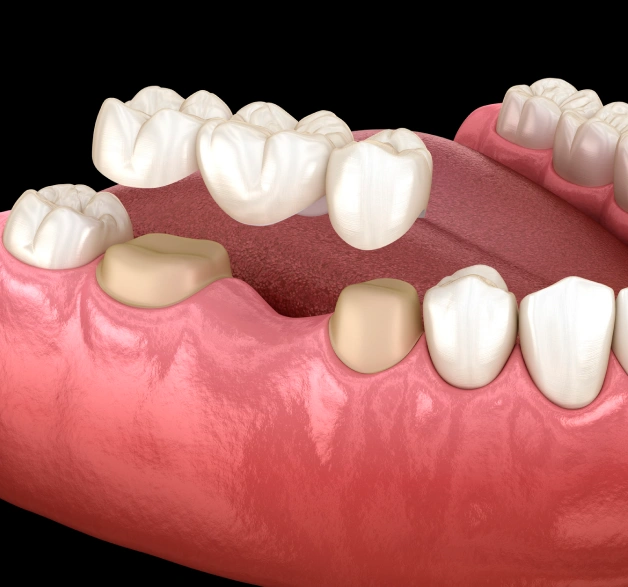Complimentary Implant Consultation

Restore Strength, Function, and Confidence to Your Smile
A damaged or missing tooth can affect not only your smile but also your ability to chew and speak comfortably. At Charlotte East Town Dental, we offer custom dental bridges and crowns to restore your teeth with durable, natural-looking solutions. Whether you need to replace a missing tooth or strengthen a weakened one, our expert team provides high-quality restorations that blend seamlessly with your natural smile.
If you’re unsure whether a bridge, or crown is the best solution for you, schedule an appointment today. We’ll help you find the right treatment to restore your smile and confidence.
What Is a Dental Bridge?
Types of Dental Bridges We Offer:
- Traditional Dental Bridge: A false tooth (pontic) is anchored by crowns on the adjacent natural teeth, creating a strong, secure restoration.
- Implant-Supported Bridge: This bridge is secured by dental implants, providing superior strength and long-term stability for multiple missing teeth.
Types of Dental Bridges We Offer:
- Traditional Dental Bridge: A false tooth (pontic) is anchored by crowns on the adjacent natural teeth, creating a strong, secure restoration.
- Implant-Supported Bridge: This bridge is secured by dental implants, providing superior strength and long-term stability for multiple missing teeth.
What Is a Dental Crown?
You May Need a Dental Crown If You:
- Have had a root canal
- Have a broken, decayed, or misshapen tooth
- Want to improve the appearance of a discolored tooth
Why Do Some Teeth Need Dental Crowns or Bridges?
A dental crown replaces the enamel covering of a tooth, and is needed when the enamel can no longer perform its function. Enamel is the hardest substance in the human body, designed to withstand the thermal, chemical and mechanical forces our teeth undergo when we eat and drink. Unfortunately, however, it is not invincible.
Enamel is susceptible to cracking, acid erosion, and decay from large cavities. Any of these reasons can lead to a weakened tooth. Patients who struggle with nighttime grinding or have had a root canal treatment may also be good candidates. A crown will then be recommended to protect your tooth from further damage.
Tips to Maintain Your Crown or Bridge
A dental crown or bridge is a significant investment made for the health of your mouth. Most dental crowns “last” (meaning they do not require any further dental work on the tooth) anywhere from five to fifteen years. The lifespan varies narrowly based on the material of the crown and widely based on patient care and maintenance.
In order to promote a long lifespan for your dental crown, you must fight cavities by performing great oral hygiene at home and seeing us consistently for professional teeth cleanings, check-ups, and topical fluoride treatments to help strengthen the teeth. This is true for promoting the lifespan of any dental work.
Another common factor in the lifespan of dental crowns or bridges is breakage from heavy forces. If you exhibit signs of clenching and/or grinding your teeth while you sleep, we will likely prescribe a protective mouthguard for you to wear at night.
